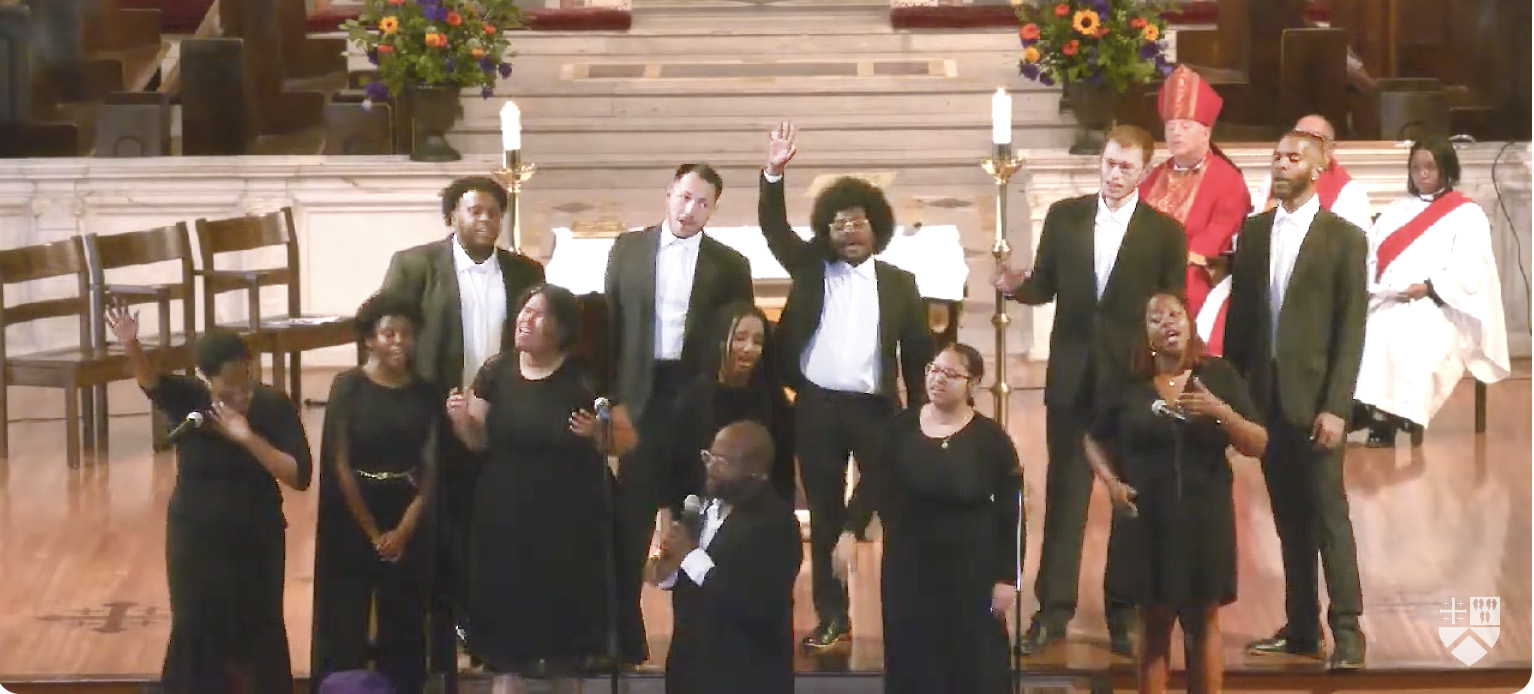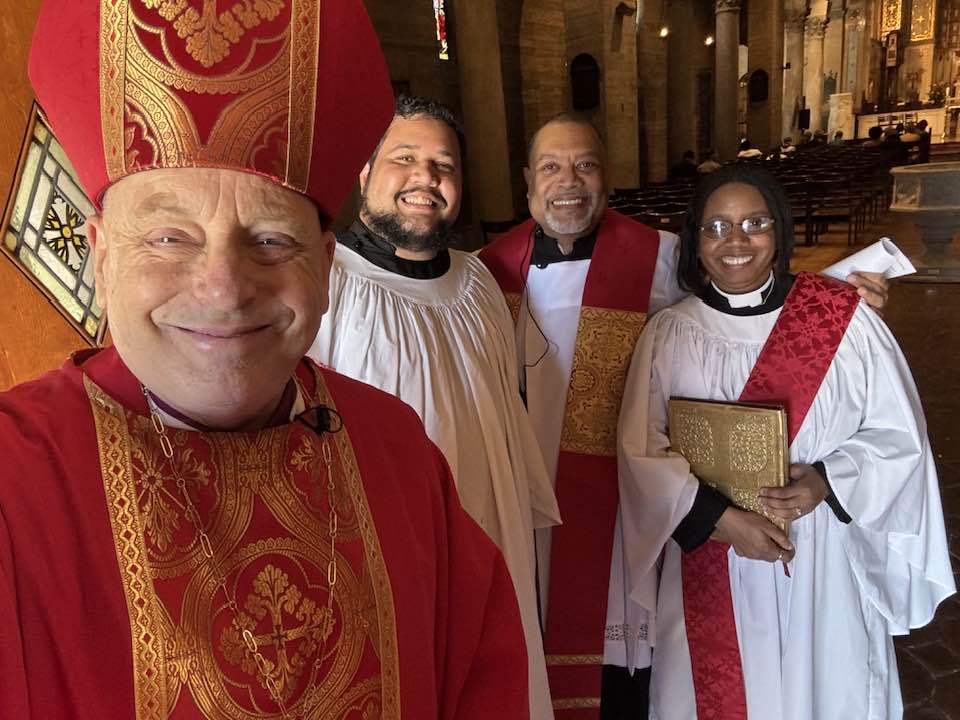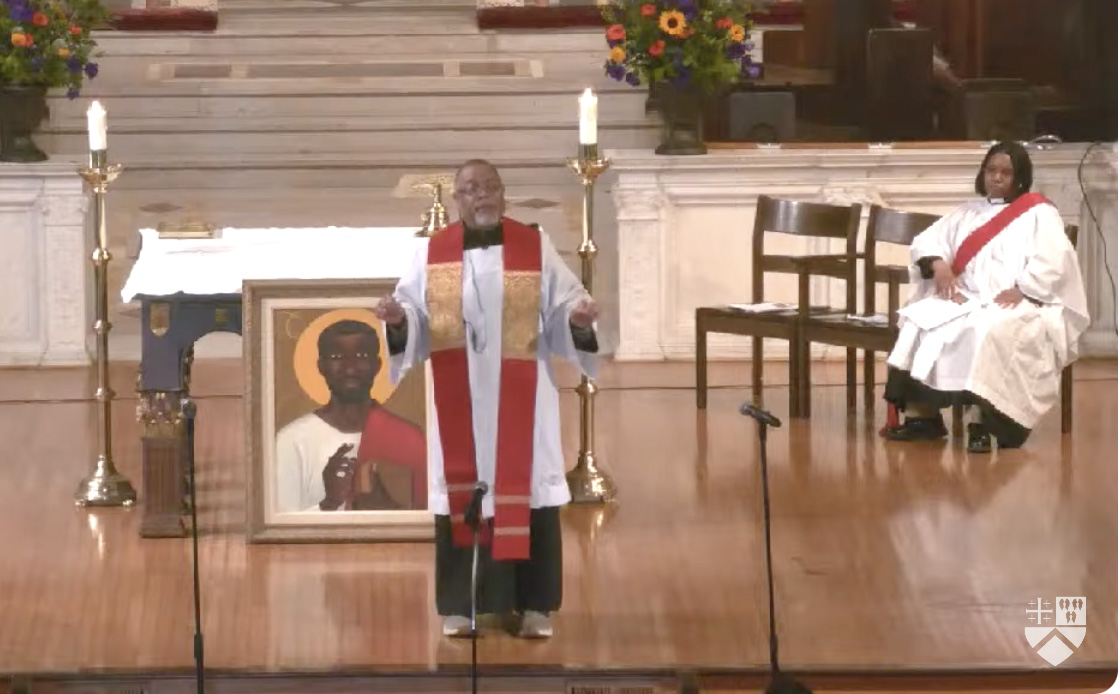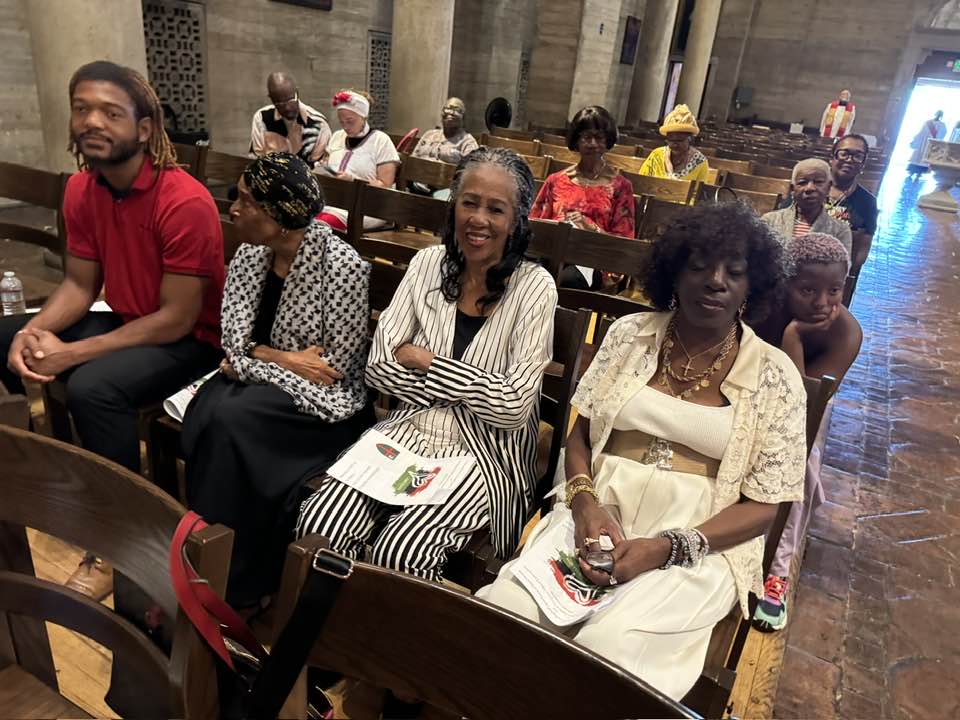
The Adrian Dunn Singers provided music for the Juneteenth service on June 15. Screenshot
[The Episcopal News] With the words “this is our 4th of July,” the Rev. Vanessa Mackenzie, vice chair of the H. Belfield Hannibal Chapter of the Union of Black Episcopalians and rector of the Church of the Advent in Los Angeles, welcomed worshippers to a spirited celebration of Juneteenth at St. John’s Cathedral on June 15.
Mackenzie invoked the memory of the Rev. James Lawson, a prominent civil rights activist who in the 1960s trained scores of volunteers in nonviolent tactics in preparation to protest laws that denied Black Americans voting rights. Lawson died June 9 at the age of 95.
“Today we come to see this great cloud of witnesses who, two years after the Emancipation Proclamation, in 1863, still toiled in Texas. And we give thanks to God. We stand in the light of courageous men and women who have gone before,” she said. “This is our Freedom Day and so we give thanks to God, because the word says if Jesus sets you free, you are free indeed.”
“We have been led by God — Amen — to this point and we know the struggle does what? It continues. May this service be a blessing of remembrance, of gratitude and a commitment to continue the struggle which our ancestors have fought for and have overcome so courageously and so faithfully and so fearlessly. Amen.”

Bishop John Harvey Taylor takes a selfie with Guy Leemhuis, preacher; Hayden Santiago, sexton; and Dominique Piper, deacon, at the Juneteenth service at St. John’s Cathedral. Photo: John Taylor
The diocesan Program Group on Black Ministries hosted the gathering along with the H. Belfield Hannibal chapter of the Union of Black Episcopalians.
Bishop John Harvey Taylor extended greetings and blessings to “our annual reminder of work left undone, debts left unpaid” and noted the origin of the celebration, which marks the date Union Army soldiers arrived in Galveston, Texas, and declared slaves in that state free.
“The so-called Confederacy had ceased to be,” Taylor said, noting that Texans “acted like nothing had happened, until the troops arrived.
“The law was one thing; what people could get away with was another thing. Saying people were free was one thing, treating people with dignity was another thing. Saying people finally had to be paid for their labor was one thing; coming up with two centuries of back pay was another.
“Proclaiming the good news in Galveston was one thing, living up to the standard of the Good News of our Lord and Savior Jesus Christ was and is another.”
The Adrian Dunn Singers offered musical selections and the Rev. Guy Leemhuis, vicar of St. Luke’s of the Mountains in La Crescenta, served as preacher, invoking the name of another civil rights giant, the late U.S. Congressman John Lewis.
Leemhuis said he intended to make some “good trouble” – a phrase Lewis coined concerning civil rights activism, noting that, while African Americans had celebrated Juneteenth for more than a century and a half, and the Black Congressional Caucus and others had advocated for decades to make it a federal holiday, that recognition wasn’t achieved until January 17, 2021, when U.S President Joe Biden signed the Juneteenth National Independence Day Act into law.
Leemhuis also invoked the name of a mentor, Beverly Robinson, African American UCLA theater professor, director and historian, documentary photographer, author, and pioneer champion for cultural diversity, who helped unwind some of the negative stereotypes associated with speech and other characteristics that have led to internalized oppression and other lasting effects of white supremacy, he said.

Dominique Piper listens as Guy Leemhuis preaches at the Juneteenth service on June 15 at St. John’s Cathedral. Screenshot
“We understand there was something done to us during slavery,” said Leemhuis, referring to the systematic stripping of language, culture and family separations that occurred, along with the persistent myth that slaves were uncivilized and needed to be Christianized.
Rather, African Americans identified with Scripture and the story of the Israelites “because their story was our story,” he said. “We, too, were suffering injustice (and) … if you celebrate Christianity you have to celebrate the gifts that the Black church has provided all of Christianity.”
He cited Episcopal Church Presiding Bishop Michael Curry, who has said, “We took Christianity and we transformed it.” Leemhuis called for further transformation, for churches to present images of Jesus that reflect the cultural diversity of the diocese, “so that little Black girls and Black boys and Latino boys and Latino girls and Asian Pacific Islander boys and girls, and indigenous folks, boys and girls, and LGBTQ boys and girls, and women, trans, cis, whatever, see these images of God … [and know] that to be made in God’s image means we all look like God.”
He added: “How do we continue to go to the church of the 21st century, and … shove it down their throats, the one and only one image of God that looks like, coincidentally, the racist, stratified system that has been in this country for over 400 years? There are all kinds of images of Christ, in different colors and cultures.
“There’s all types of pictures of God in the feminine … like Hildegarde of Bingen and Julian of Norwich.” While the church has been talking about racial reconciliation since 1990s, he added, “when do we have the will to do it?
“If Jesus did make the last first and the first last, then there is hope in the world,” Leemhuis declared. “If that love was the kind of love Jesus is talking about, then sign me up, no matter how long it will take.” Change requires true commitment, he said, adding: “My ancestors didn’t wait to be freed. They took freedom.”

Attendees await the beginning of the Juneteenth service. Photo: John Taylor
Taylor also noted the “sin of mass incarceration and of treating addiction and mental illness as a crime.” At least 15 resolutions regarding the conflict in Israel-Palestine have been submitted for consideration at the upcoming June 23-28 General Convention of The Episcopal Church in Louisville, Kentucky, he said. Only one regarding mass incarceration has been introduced. (Taylor’s remarks are posted in the Bishop’s Blog.)
“People are in jail and in prison because we’re still deciding to leave some people behind …. punishing them for the color of their skin and for being sick,” Taylor said. Referring again to the proposed legislation, he added, “It’s all good work that all needs to be done.
“This is a church, mind you – a church which Jesus had something to say about prisons and captives because for many of our incarcerated siblings today, it’s like they’re back in Texas, back in Galveston, waiting for the army to come. Or, for the spirit of God, like in the Book of Acts – waiting for someone to break through the walls of the prison and give them the good news of Jesus Christ, that the prisoner is free at last.”
